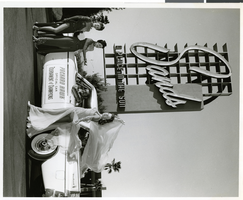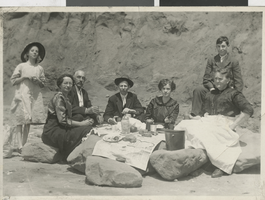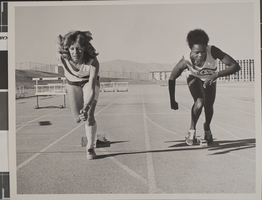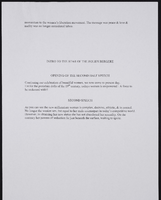Search the Special Collections and Archives Portal
Search Results

Photograph of a Packard, Sands Hotel and Casino, Las Vegas, circa 1952-1969
Date
Archival Collection
Description
Image

Photograph of Lena Hammond and others, Goldfield (Nev.), 1910s
Date
Archival Collection
Description
Image
Audio clip from interview with Dorothy Eisenberg, October 23, 2014
Date
Archival Collection
Description
Part of an interview with Dorothy Eisenberg on October 23, 2014. In this clip, Eisenberg discusses how she became involved with the Democratic party and the League of Women Voters in Las Vegas.
Sound

Photograph of Helldorado registration desk, Las Vegas (Nev.), 1934-1950
Date
Archival Collection
Description
Image
Soroptimist International of Greater Las Vegas and Paradise Valley Records
Identifier
Abstract
The Soroptimist International of Greater Las Vegas and Paradise Valley Records document the activity of two Las Vegas, Nevada chapters of the women's advocacy group Soroptimist International from 1968 to 2000. The records contain membership information, by-laws, correspondence, scrapbooks, publications, memoranda, and ephemera about women's issues, environmental concerns, and the club's activities in the Greater Las Vegas and Paradise Valley chapters. The records also contain information from conferences held by Soroptimist International, including audio cassette recordings of speeches and presentations.
Archival Collection
Tina Boag, Cynthia Cicero, Joanne Ravetti, and Betty Brown oral history interview
Identifier
Abstract
Oral history interview with Tina Boag, Cynthia Cicero, Betty Brown, and Jan Ravetti conducted by Claytee D. White on 2014 March 28 for the West Charleston Neighborhoods: An Oral History Project of Ward 1.
The women recall coming to Las Vegas, Nevada to obtain jobs during the period of mob ownership of the Las Vegas hotel/casinos.
Archival Collection

Photograph of Linda Cornielius and Beatrice Emodi, University of Nevada, Las Vegas, 1976
Date
Archival Collection
Description
Image
Claude Trenier oral history interview
Identifier
Abstract
Oral history interview with Claude Trenier conducted by Claytee White on February 13, 1997 for the Women's Research Institute of Nevada (WRIN). Trenier discusses joining a band at the age of twenty two in 1941 and traveling around the country. Trenier describes working in Las Vegas, Nevada; Miami, Florida; and New York City, New York. Trenier also discusses the racism he saw as an African American performer, recalling that racial discrimination was especially fervent in Las Vegas. Trenier describes how many African American musicians and performers were allowed to perform in casinos, but not reside or lounge on the properties. Trenier also discusses the Moulin Rouge and his thoughts about its sudden closure in 1955. Finally, Trenier talks about his interactions with other entertainers at the time like Duke Ellington and Nat Cole King.
Archival Collection


